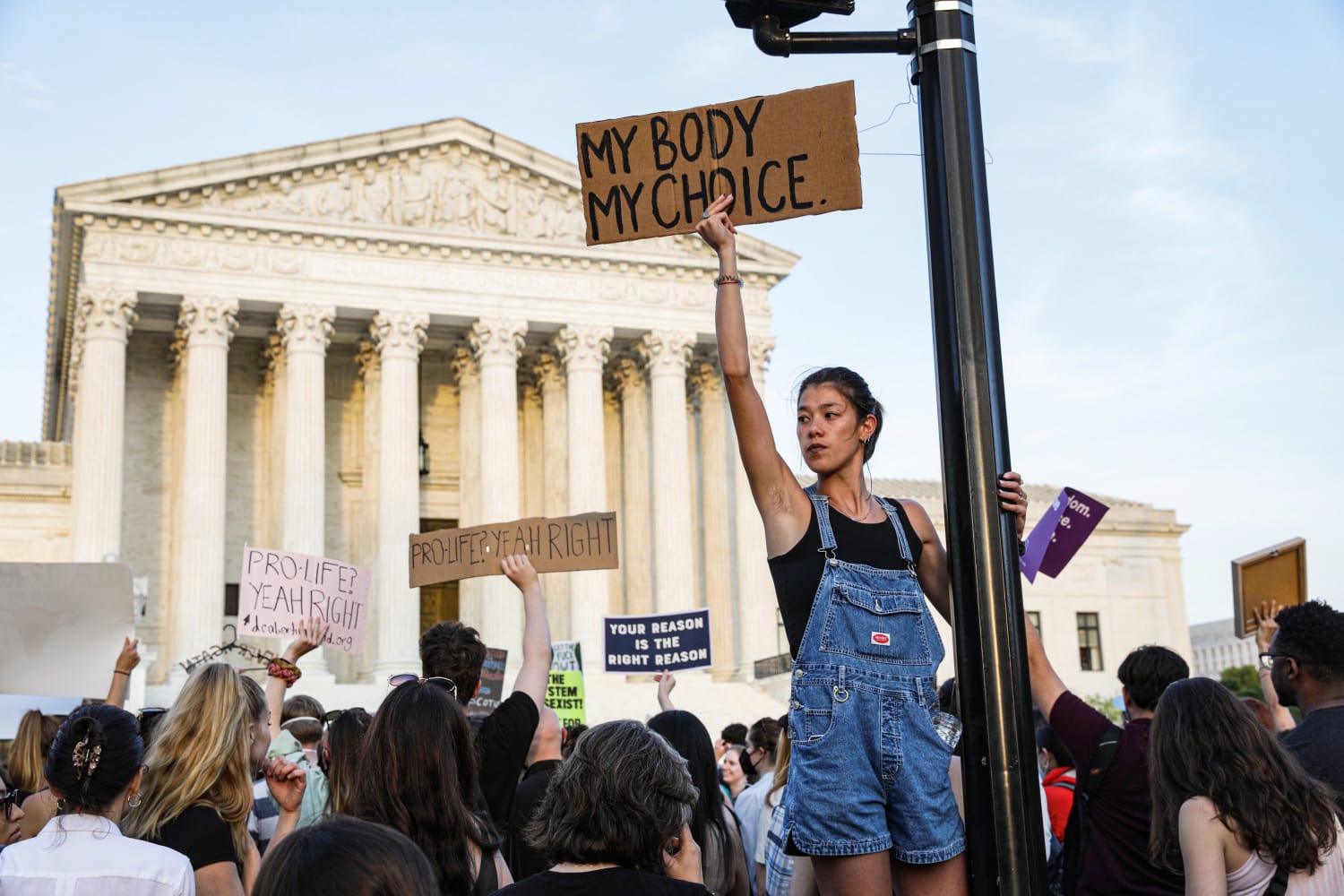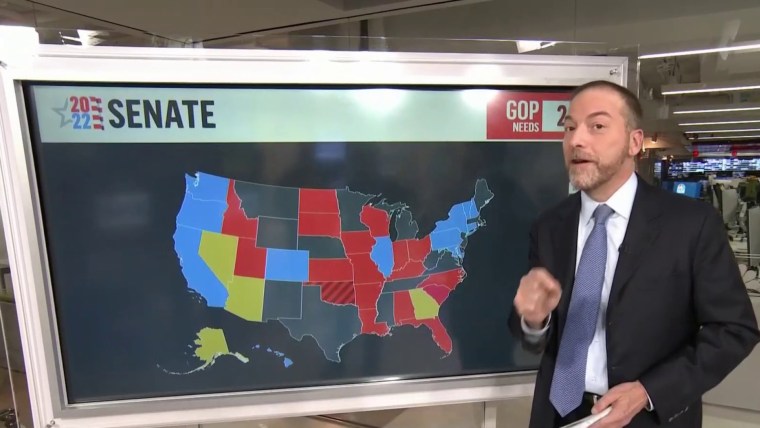WASHINGTON — The conservative-majority Supreme Court left its imprint on the 2022 elections, galvanizing Democrats with decisions on guns and abortion and potentially aiding Republicans with election rulings.
The court’s outsize influence underscores how the conservative 6-3 majority has energetically embraced divisive political issues, placing itself in the crosshairs as questions about the court’s legitimacy rage. Before the current majority was formed as a result of former President Donald Trump’s three appointments, the court, which had a 5-4 conservative majority, was generally more cautious in taking up contentious cases and was more rarely at the center of the political debate.
The NBC News Exit Poll on Tuesday showed that Democrats were fired up by the court’s June decision that overturned the landmark 1973 Roe v. Wade precedent that protected the right to abortion. It also indicated that gun control is becoming an energizing issue for Democrats in the wake of another Supreme Court decision in June that expanded the right to bear arms outside the home.
On the other side of the ledger, the Supreme Court’s decisions on election issues — including two this year to allow Republicans to use congressional district maps in Alabama and Louisiana that lower courts had deemed unlawful — as well as the knock-on effect of those decisions in other states, have also attracted scrutiny.
The rulings may have helped the Republicans pick up vital seats in the closely fought battle for control of the House, with the outcome yet to be determined.
Liberal groups were happy to point a finger at the court for its election-related rulings, with Sarah Lipton-Lubet, the executive director of the Take Back the Court Action Fund, saying the court’s conservative majority “tried to stack the deck for their party through a series of decisions weakening our democracy.” The court helped pave the way to a potential Republican majority in the House by “greenlighting voter suppression and gerrymandering,” she said.
Conservatives disagreed.
John Malcolm, a senior legal fellow at the Heritage Foundation, said criticism of the justices’ motives is “dangerous rhetoric,” because it mischaracterizes the role of the court as an independent, apolitical branch of government.
“These justices are life-tenured for a reason. They have a very important role to decide what the Constitution says and to interpret statutes. That’s not supposed to be based on licking your finger and holding it up to the political winds,” he said.
Anger over abortion ruling
The NBC News poll found that 39% of voters were “angry” as a result of the abortion ruling, while 21% more said they were “dissatisfied.” On guns, 56% said they support stricter gun laws. The high court’s gun ruling came after several high-profile mass shootings, including the shooting in which 19 children and two teachers were killed in Uvalde, Texas.
For decades, it was the Republican Party that benefited from conservative anger over the Supreme Court’s original ruling in Roe v. Wade. The June decision appears to have flipped the script, as many had predicted, with liberals now expressing hostility toward the court. Voters on Tuesday backed candidates in key races who ran on backing abortion rights — such as Josh Shapiro, the Democrat who won the governor’s race in Pennsylvania — as well as abortion protections on the ballot.
“The change in the legal environment dramatically affects how people feel. This vote affects something that is important to them. It’s really changed the dynamic of who feels they have a lot at stake,” said Carolyn Shapiro, a professor at Chicago-Kent College of Law.
The response to the abortion ruling probably wouldn’t have surprised the conservative justices in the majority, as Justice Samuel Alito noted in his majority opinion that the court was returning the issue to states so elected representatives could decide what approach to take.
“Whether they are happy with the outcome of the votes is neither here nor there,” Malcolm said of the justices.
The court has shown no sign of backing away from taking up contentious cases as a result of recent concerns raised about its legitimacy’s being undermined, which have included pointed remarks made by liberal justices. Just last week, the conservative justices indicated they could end any consideration of race in college admissions, and in December the court will hear major cases that could have big impacts on elections and LGBTQ rights.
Diluting the Black vote
If Republicans win control of the House, the Supreme Court could claim an assist.
In January, a lower court blocked the Republican-drawn map in Alabama, saying it was applying settled law in finding that the map most likely discriminated against Black voters by diluting their votes. The Supreme Court, which blocked the ruling in a 5-4 vote the next month and heard oral arguments in the case in October, could further weaken the Voting Rights Act, which was enacted to protect minority voting rights.
In practical terms, a redrawn map could have led to Democrats’ having two seats of the seven in Alabama, with Black voters traditionally more likely to vote for Democratic candidates. With the Republican-drawn map in use, Democrats won a single seat.
In Louisiana, the Supreme Court in June allowed Republicans to use a map of its six districts that a judge had struck down because, as in Alabama, it had just one instead of two districts where Black voters would have good chances to elect the representatives of their choosing. Using the new map, Republicans won five of the six districts Tuesday.
Davin Rosborough, a voting rights lawyer at the American Civil Liberties Union, highlighted that the Supreme Court had blocked lower court rulings through emergency requests on its so-called shadow docket without full briefing and oral argument.
“It’s hard to say the Supreme Court’s willingness to intervene on the shadow docket doesn’t encourage places that want to proceed with racially dilutive maps to do so knowing that they have a better chance of getting away with it for at least one election cycle,” he said.
The Supreme Court’s fingerprints were also on other redistricting issues, dating to its 2019 ruling that gave a green light to so-called partisan gerrymandering — allowing state legislators to draw maps to maximize the benefits to their own parties. Voting experts point to how Republican-led Florida took advantage of that leeway in drawing its maps, while Democratic-led New York tried to do something similar, only to have a state court block those maps. As states with large populations, both have outsize influence on House elections.
Under the old Florida map, which was used in 2020 before a seat was added after the 2020 census, Republicans won 16 of 27 seats. Under the newly drawn map, Republicans won 20 of 28 seats.
In New York, Democrats won 19 of 27 seats in 2020 using that year’s map. The state lost one seat after the census, and a court-approved map was used after a state court rejected a new map drawn by Democrats. On a bad night for Democrats in the state Tuesday, they have won 15 of 26 races, with one not called. Republicans have picked up four seats.
The Supreme Court’s 2019 ruling said partisan gerrymandering claims could not be adjudicated by federal courts. It left the door open to state courts to decide such claims, but only some have taken up the option. A ruling that allowed partisan gerrymandering claims might not necessarily have led to Florida’s maps’ being blocked, said Michael Li, a voting rights lawyer at the Brennan Center for Justice at New York University School of Law, but it might have prompted states to take a more cautious approach to drawing maps.
“It would have been night and day,” he said.
Source: | This article originally belongs to Nbcnews.com











